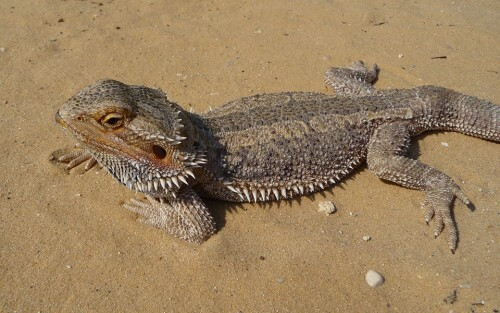In the Australian bearded vulture, mating changes depending on the temperature. A male that becomes a female is more fertile than an original female

For the first time, documentation in nature of a reptile that changes from male to female depending on temperature.
Determining sex in the animal world is quite a flexible thing and sex reversal is known to us from fish and rarely in amphibians as well but has not been observed in nature in terrestrial vertebrates (reptiles, birds and mammals) so far. In an article published this week in the Nature newspaper, the fascinating discovery is described. Australian bearded dragon (Pogona vitticeps) whose natural distribution is in arid regions of central Australia can change its zygote from a genotypic determination (gene-dependent) to an environmental determination dependent on temperature. It is important to emphasize, the change of mate occurs even before the hatching occurs.
The researcher who led the study, Dr. Clare Holleley, says that in the past it was discovered that exposure of gophers to high temperatures in laboratory conditions changes the mating of males to females. Now researchers have proven that this phenomenon also occurs in nature. What is amazing is that the males that became females were more fertile than "normal" females. Moreover, it turns out that the offspring of these females are more sensitive to temperature and they undergo mating reversal at lower temperatures. This means that at the population level the transition between genotypic mating and environment-dependent mating can be very fast.
This research has great ecological importance - understanding the mechanisms that lead to mating reversal depending on the environment can shed light on the expected evolutionary changes as a result of global warming and the impact of these changes on the diversity of species.

6 תגובות
Thanks to Uri and Assaf. I hope, for these nerds, that there is some freedom and the change is not absolute for everyone at the same temperature. Otherwise they will really become extinct.
Hello Herzl,
Indeed, under the conditions of the laboratory at a certain temperature, all the male offspring will turn into females. This does not mean that the adult males change their sex and indeed in nature there is no such finding of a monogamous population but there is a fear that such a situation will happen in an isolated population with global warming.
Ori
Hello Assaf,
I added a sentence referring to the fact that the mating changes occur before hatching.
Ori
In the subject's picky eater, the pairing is reversed...
Before hatching... in the swamp!
It is known that in many reptiles the mating of the newborn/hatched is determined by the temperature,
The article lacks (also in the original) the mention of the main fact:
The changes happen when the hardon is still in the swamp...
In the subject's picky eater, the pairing is reversed...
A little more explanation is needed here - after all, if all these hornets turn into females above a certain temperature, how do they reproduce? Or maybe not everyone changes their gender? Or not at the same temperature? Or are they violating themselves by saving sperm? or what???